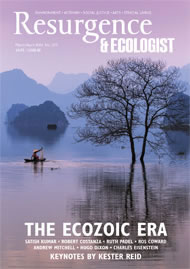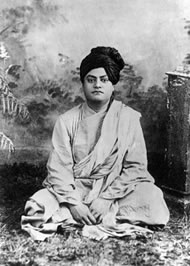This year marks the 150th birth celebrations of Swami Vivekananda, who travelled to Chicago in 1893 to address the World’s Parliament of Religions and returned home to India as ‘the monk who changed the world’. Although a Hindu, Swami Vivekananda was a pluralist, who taught that all religions were paths to the same goal of God realisation or enlightenment, like many rivers flowing to the same ocean. Thus we should respect all religions and spiritual paths as different routes to the same destination. All too often we focus on the differences between religions when we should be looking at the similarities. One of the main similarities is the Golden Rule, shared by all faiths, which states that we should treat others as we would wish to be treated ourselves. But maybe one of our differences is how we define those ‘others’.
Swami Vivekananda once said: “The highest truth is this: God is present in all beings, they are his multiple form … the first of all worships is the worship of those around us. He alone serves God who serves all other beings.” Hinduism is recorded in ancient Indian texts called the Vedas, based on the philosophy of Vedanta, which means ‘perfect knowledge’ or ‘enlightenment’. Such perfect knowledge is acquired through the inward study of the mind through meditation. The Vedantists believe that long before the universe was created there existed a universal spirit called Brahman – everything was spirit. The creation of the universe was the result of the cooling of some of this essence into matter, and this resulted in the cosmos that we are familiar with. According to Vedanta philosophy, Brahman still exists and all living beings are separated parts of it who are working to be reunited with it.
The concept that only human beings have souls and that all other animals have been put on Earth to serve them is totally alien to Vedanta philosophy, which states that we are all related, we are all connected, and to break that connection results in a breakdown in the fabric of life. The Paramahamsa Upanishad asks: “What is the state of the illumined one?” and answers: “He has renounced all selfish attachments and observes no rites or ceremonies. He has only minimal possessions and lives his life for the welfare of all.”
Vedanta philosophy is not alone in including all sentient beings in its circle of compassion. In Taoism, Lao Tzu talks of a “community of feeling for all living things” in the Tao Te Ching, which says: “From this community of feeling comes a kingliness of character and he who is king-like goes on to be heaven-like.” In that likeness to heaven he possesses the Tao, regarded by Taoists as a universal spirit or energy, similar to the Brahman of Vedanta philosophy, existing in all living beings.
One of the most beautiful spiritual philosophies is Jainism, based on the concept of ahimsa, which means ‘nonviolence’ and is applied to all living things. Modern Jainism follows the teachings of Mahavira, who was born in 599 BCE and was the last in a series of 24 Tirthankars. Tirthankar means ‘ford-maker’, or one who guides others across the river of suffering to enlightenment. Mahavira said: “Unless we live with nonviolence and reverence for all living beings in our hearts, all our humaneness and acts of goodness, all our vows, virtues and knowledge, all our practices to give up greed and acquisitiveness are meaningless and useless.” The Jains also have this beautiful prayer:
I ask pardon from all living creatures,
May all creatures pardon me.
May I have friendship for all creatures
And enmity towards none.
When one of Mahavira’s predecessors, the prince Neminath, arrived for his wedding at the home of his in-laws-to-be, he saw pens tightly packed with animals. He asked his aides why they were being confined in this way and they informed him that the animals were awaiting slaughter for his wedding feast. Shocked by this, Neminath told the father of his bride that he could not go ahead with the wedding. Animals had souls and feelings like our own, he argued, and should not be slaughtered and eaten. This was his true Jain spirit shining through. He abandoned his wedding and became the 22nd Tirthankar.
Buddhism is also strongly associated with compassion. The 14th Dalai Lama says: “In Buddhism the highest spiritual ideal is to cultivate compassion for all sentient beings and to work for their welfare to the greatest possible extent.” Whilst most people are familiar with the story of Siddhartha Gautama sitting under the Bodhi tree and achieving enlightenment whilst meditating, few are aware that he was meditating on compassion for all living things. Siddhartha had abandoned the luxurious life of a prince after leaving the royal palace on an excursion to see what lay beyond the walls. There he had seen four sights that had shocked him greatly: a sick man, an old man, a dead man and a sadhu (holy man). Horrified by the suffering of sickness, old age and death, Siddhartha decided to become a sadhu himself in order to overcome this suffering.
After living a life of renunciation with the austerities of yoga, he failed to achieve the enlightenment he had sought, so he went away into the forest to try and discover his own method for attaining enlightenment. He thought back to a time in the past when, as a child, he had felt a total elimination of the sense of self and ego, which he perceived as the root of all dissatisfaction and suffering. He remembered when, sitting under a tree, he had seen a plough churning up the soil and destroying the young shoots and insects. He had felt total empathy with the insects and compassion for their suffering. In that moment he had lost his sense of self and his own suffering, as his compassion was turned completely towards the insects. He discovered that by meditating on and practising compassion towards others, he could forget himself and his own suffering and eliminate his sense of ego and achieve enlightenment. Buddhists also have a beautiful prayer:
Enthused by wisdom and compassion
Today in the Buddha’s presence
I generate the mind for full awakening
For the benefit of all sentient beings.
Many of the ancient Greek philosophers shared this feeling of unity with all sentient beings. Pythagoras founded the Pythagorean sect, which studied science and mathematics and practised yoga and non-meat-eating. He said: “Animals share with us the privilege of having a soul,” and: “As long as man continues to be the ruthless destroyer of lower living beings, he will never know health or peace.”
Socrates, Plato and Plutarch, believing in a Platonic Realm where the soul resides, also believed that all living creatures had souls. Plutarch said: “Kindness and benevolence should be extended to the creatures of every species.” Later great geniuses such as Leonardo da Vinci and Albert Einstein shared these feelings of unity of spirit with the animal kingdom. Einstein said: “A human being is part of the whole, called by us the ‘universe’, a part limited in time and space. He experiences himself, his thoughts and feelings as something separate from the rest – a kind of optical delusion of his consciousness. This delusion is a kind of prison for us, restricting us to our personal desires and to affection for a few persons nearest to us. Our task must be to free ourselves from this prison by widening our circle of compassion to embrace all living creatures and the whole of nature in its beauty.”
Up until the time of Thomas Aquinas, who brought speciesism into the Church in the 12th century, many of the Christian saints included animals in their circle of compassion. Saint Francis, who died the year after Aquinas was born, is remembered as the patron saint of animals, but he was just the last in a long line of Christians who cared for animals. Saint Benedict, who founded the Benedictine order of monks, forbade his monks to eat meat unless they were ill. There were many beautiful prayers for the animal kingdom. Saint John Chrysostum wrote: “The Saints are exceedingly loving and gentle to mankind and even to brute beasts… Surely we ought to show them great kindness and gentleness for many reasons, but above all because they are the same origin as ourselves.”
Darwin later confirmed that all animals are related when he discovered evolution and put to bed once and for all the notion that humans are somehow separate from the rest of the animal kingdom. He said that the difference was one of degree and not of kind. Thomas Hardy highlighted the moral implications of this when he wrote: “The establishment of the common origin of all species logically involves a readjustment of altruistic morals, by enlarging the application of what has been called the ‘Golden Rule’ from the area of mere mankind to that of the whole animal kingdom.”
Not only do we share the same evolution and biological structure as animals, but our brains are essentially the same, with humans having a slightly more developed neocortex. We share the hindbrain, the reptilian complex, the limbic system and most of the neocortex with all other animals, and as it is in the limbic system that most of the emotions reside, other animals must share much of our emotional lives.
So why do we in the Western world, in contrast with the great spiritual teachings of the East, treat animals differently from us, thinking that they are ours to do with as we please and that their suffering is irrelevant? The answer is more complex than just a few unfortunate quotes from the Old Testament and the teachings of Aristotle and Aquinas. I will not spend time debating them here.
The important thing is to learn from our great spiritual heritage and to understand that we are all interconnected and interrelated. To cause harm to any living creature is to be disconnected – not only from those we harm, but from our mother Earth and the whole universe. Most importantly, it is to be disconnected from ourselves and from the universal spirit, whether that be called Brahman, the Tao, God or simply Nature.
Gandhi said: “It ill becomes us to invoke in our daily prayers the blessings of God the Compassionate, if we in turn will not practise elementary compassion towards our fellow creatures.”








